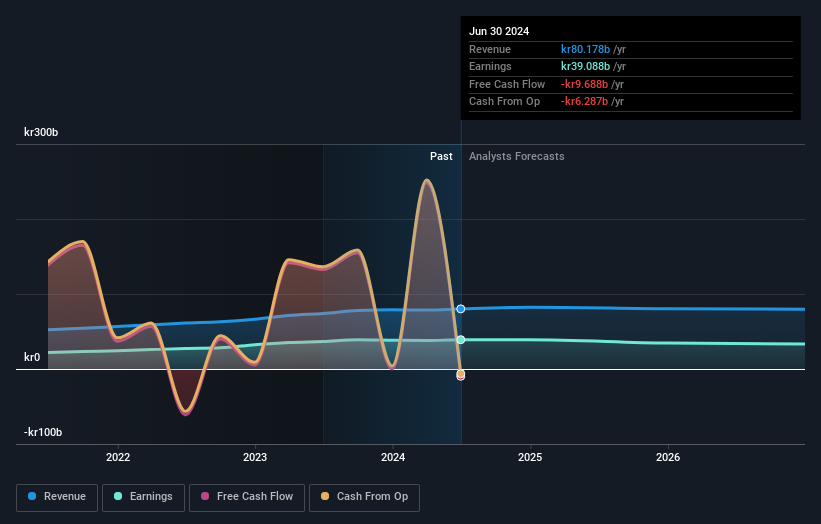DNB Bank ASA Just Recorded A 14% EPS Beat: Here's What Analysts Are Forecasting Next

DNB Bank ASA (OB:DNB) investors will be delighted, with the company turning in some strong numbers with its latest results. DNB Bank beat earnings, with revenues hitting kr22b, ahead of expectations, and statutory earnings per share outperforming analyst reckonings by a solid 14%. Following the result, the analysts have updated their earnings model, and it would be good to know whether they think there's been a strong change in the company's prospects, or if it's business as usual. Readers will be glad to know we've aggregated the latest statutory forecasts to see whether the analysts have changed their mind on DNB Bank after the latest results.
See our latest analysis for DNB Bank

Taking into account the latest results, the most recent consensus for DNB Bank from 13 analysts is for revenues of kr82.4b in 2024. If met, it would imply a credible 2.8% increase on its revenue over the past 12 months. Statutory earnings per share are forecast to dip 2.2% to kr26.26 in the same period. Before this earnings report, the analysts had been forecasting revenues of kr80.9b and earnings per share (EPS) of kr24.86 in 2024. The analysts seems to have become more bullish on the business, judging by their new earnings per share estimates.
The consensus price target was unchanged at kr216, implying that the improved earnings outlook is not expected to have a long term impact on value creation for shareholders. The consensus price target is just an average of individual analyst targets, so - it could be handy to see how wide the range of underlying estimates is. The most optimistic DNB Bank analyst has a price target of kr246 per share, while the most pessimistic values it at kr194. This is a very narrow spread of estimates, implying either that DNB Bank is an easy company to value, or - more likely - the analysts are relying heavily on some key assumptions.
These estimates are interesting, but it can be useful to paint some more broad strokes when seeing how forecasts compare, both to the DNB Bank's past performance and to peers in the same industry. We would highlight that DNB Bank's revenue growth is expected to slow, with the forecast 5.7% annualised growth rate until the end of 2024 being well below the historical 11% p.a. growth over the last five years. By way of comparison, the other companies in this industry with analyst coverage are forecast to grow their revenue at 0.8% annually. So it's pretty clear that, while DNB Bank's revenue growth is expected to slow, it's still expected to grow faster than the industry itself.
The Bottom Line
The biggest takeaway for us is the consensus earnings per share upgrade, which suggests a clear improvement in sentiment around DNB Bank's earnings potential next year. Fortunately, they also reconfirmed their revenue numbers, suggesting that it's tracking in line with expectations. Additionally, our data suggests that revenue is expected to grow faster than the wider industry. The consensus price target held steady at kr216, with the latest estimates not enough to have an impact on their price targets.
With that said, the long-term trajectory of the company's earnings is a lot more important than next year. We have forecasts for DNB Bank going out to 2026, and you can see them free on our platform here.
We don't want to rain on the parade too much, but we did also find 2 warning signs for DNB Bank (1 doesn't sit too well with us!) that you need to be mindful of.
New: Manage All Your Stock Portfolios in One Place
We've created the ultimate portfolio companion for stock investors, and it's free.
• Connect an unlimited number of Portfolios and see your total in one currency
• Be alerted to new Warning Signs or Risks via email or mobile
• Track the Fair Value of your stocks
Have feedback on this article? Concerned about the content? Get in touch with us directly. Alternatively, email editorial-team (at) simplywallst.com.
This article by Simply Wall St is general in nature. We provide commentary based on historical data and analyst forecasts only using an unbiased methodology and our articles are not intended to be financial advice. It does not constitute a recommendation to buy or sell any stock, and does not take account of your objectives, or your financial situation. We aim to bring you long-term focused analysis driven by fundamental data. Note that our analysis may not factor in the latest price-sensitive company announcements or qualitative material. Simply Wall St has no position in any stocks mentioned.
Have feedback on this article? Concerned about the content? Get in touch with us directly. Alternatively, email editorial-team@simplywallst.com
About OB:DNB
DNB Bank
Provides financial services to individuals and businesses in Norway and internationally.
Undervalued with proven track record.
Similar Companies
Market Insights
Community Narratives




